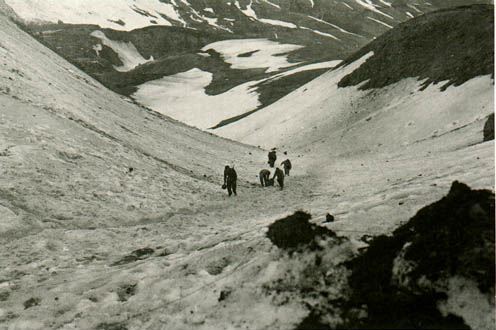Sgt. Rodgers wrote his letter on Dec. 2, 1943, in Hawaii and it was later published in the Dec. 28, 1943 edition of the Herald.
The letter is addressed to ‘Bud’, his younger brother. Rodgers excuses himself for not writing sooner but he’s been quite busy, however, he says he would try to write that afternoon. He says he’s glad his brother Paul sent him such a letter and that he is very proud of him for the work he does at school.
Paul asked his brother in one of his letters to tell him a story for one of his papers. “Well I am not much at telling stories but will try to tell you a little about our battle of Attu,” wrote Rodgers.
The ship was crowded; he couldn’t say the name of the ship he was on, but he wrote about how crowded it was. None of them had ever been in combat before; they did not know what was going to happen. The first week was fine, he said, but then they reached rough waters and it wasn’t fine anymore. They had to pick up fuel at Cold Harbor, Alaska.
When the 10th day came, they got hit by a storm, a real storm. Boys were getting sick and some of them stayed sick for days, while others were fine after a couple of days. They were trained for desert and fighting in the snow. The attack was meant to start on the 7th of May but the group was stuck around the Bering Sea, due to another storm. It was raining and it was cold and foggy, the My Plainview reports.
On the 11th on May, by 3 in the afternoon, the boat was loaded and they were ready to go. By 11:15, they were close enough to see the Navy pilot lights that were supposed to guide them. Some of the boys were already asking themselves if they would ever see their families and homes again, but they were quite excited at the same time. “I don’t think I was afraid but I wasn’t feeling too brave either,” wrote Rodgers.
He said that the Japs had been on the island for a year and that it would be difficult to get them out. What was worse – of 21 days of fighting, they only had three days of sunshine. On the ship they were told that everything was going to end in less than 36 hours because the island was small.
For 21 days the battle didn’t stop. They slept in the mud only when they had a chance to sleep and did the same with food. They were wet but had nothing to burn and dry their clothes. The only thing that kept them going like that for days was the ‘American determination’ to win and pay them back for bombing Pearl Harbor.
“Well, Bud, the next good news we got was when they sent word out that all the enemy had been knocked out,” continued Rodgers, “after the battle was over we did nothing but eat and sleep for one week.”
